听力材料
- 格式:doc
- 大小:60.00 KB
- 文档页数:14
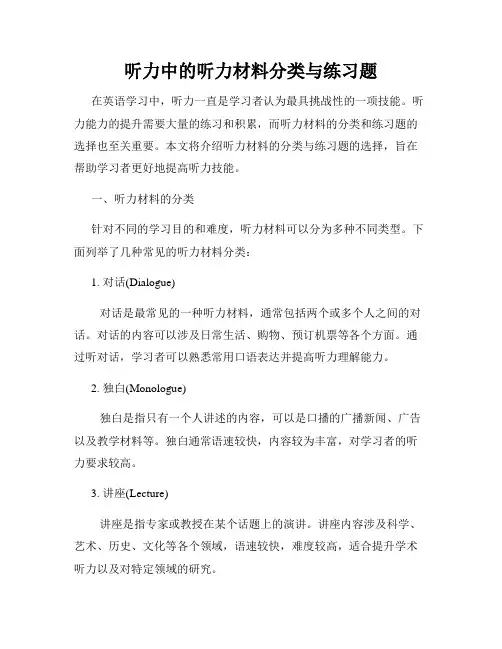
听力中的听力材料分类与练习题在英语学习中,听力一直是学习者认为最具挑战性的一项技能。
听力能力的提升需要大量的练习和积累,而听力材料的分类和练习题的选择也至关重要。
本文将介绍听力材料的分类与练习题的选择,旨在帮助学习者更好地提高听力技能。
一、听力材料的分类针对不同的学习目的和难度,听力材料可以分为多种不同类型。
下面列举了几种常见的听力材料分类:1. 对话(Dialogue)对话是最常见的一种听力材料,通常包括两个或多个人之间的对话。
对话的内容可以涉及日常生活、购物、预订机票等各个方面。
通过听对话,学习者可以熟悉常用口语表达并提高听力理解能力。
2. 独白(Monologue)独白是指只有一个人讲述的内容,可以是口播的广播新闻、广告以及教学材料等。
独白通常语速较快,内容较为丰富,对学习者的听力要求较高。
3. 讲座(Lecture)讲座是指专家或教授在某个话题上的演讲。
讲座内容涉及科学、艺术、历史、文化等各个领域,语速较快,难度较高,适合提升学术听力以及对特定领域的研究。
4. 新闻(News)新闻是指报道时事、社会热点以及其他相关事件的资讯内容。
新闻的语速较快,新闻用词较为专业,对学习者的听力水平和对时事的了解有一定要求。
5. 广播(Broadcast)广播包括电台节目、电视节目等广播媒体的内容。
广播的形式多样,内容涵盖广泛,既有音乐娱乐类节目,也有新闻时事类节目,适合提高听力技能和扩大知识面。
二、练习题的选择选择合适的练习题对于听力技能的提升具有重要意义。
下面列举了几种常见的练习题类型:1. 听力选择题(Multiple Choice)听力选择题是指根据听力材料的内容,在给出的选项中选择正确答案。
这种类型的题目能够考察学习者对细节的捕捉和整体理解能力。
2. 填空题(Completion)填空题要求学习者根据听力材料的内容,在空格处填写正确答案。
这种类型的题目能够锻炼学习者的听写能力和对语境的判断。
3. 判断正误题(True or False)判断正误题要求学习者根据听力材料的内容判断给定的陈述是否正确。
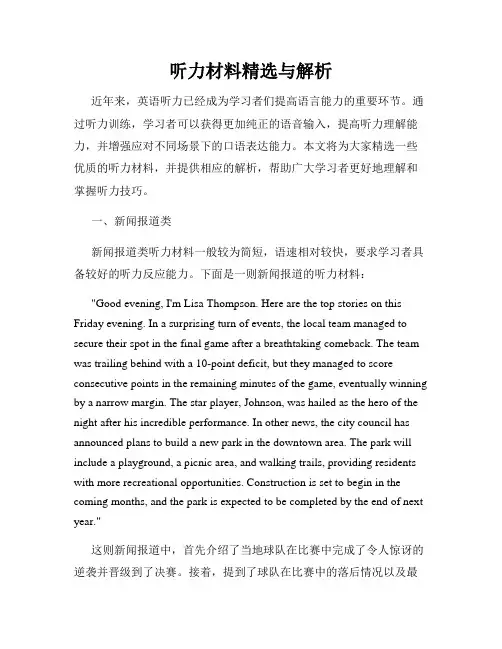
听力材料精选与解析近年来,英语听力已经成为学习者们提高语言能力的重要环节。
通过听力训练,学习者可以获得更加纯正的语音输入,提高听力理解能力,并增强应对不同场景下的口语表达能力。
本文将为大家精选一些优质的听力材料,并提供相应的解析,帮助广大学习者更好地理解和掌握听力技巧。
一、新闻报道类新闻报道类听力材料一般较为简短,语速相对较快,要求学习者具备较好的听力反应能力。
下面是一则新闻报道的听力材料:"Good evening, I'm Lisa Thompson. Here are the top stories on this Friday evening. In a surprising turn of events, the local team managed to secure their spot in the final game after a breathtaking comeback. The team was trailing behind with a 10-point deficit, but they managed to score consecutive points in the remaining minutes of the game, eventually winning by a narrow margin. The star player, Johnson, was hailed as the hero of the night after his incredible performance. In other news, the city council has announced plans to build a new park in the downtown area. The park will include a playground, a picnic area, and walking trails, providing residents with more recreational opportunities. Construction is set to begin in the coming months, and the park is expected to be completed by the end of next year."这则新闻报道中,首先介绍了当地球队在比赛中完成了令人惊讶的逆袭并晋级到了决赛。
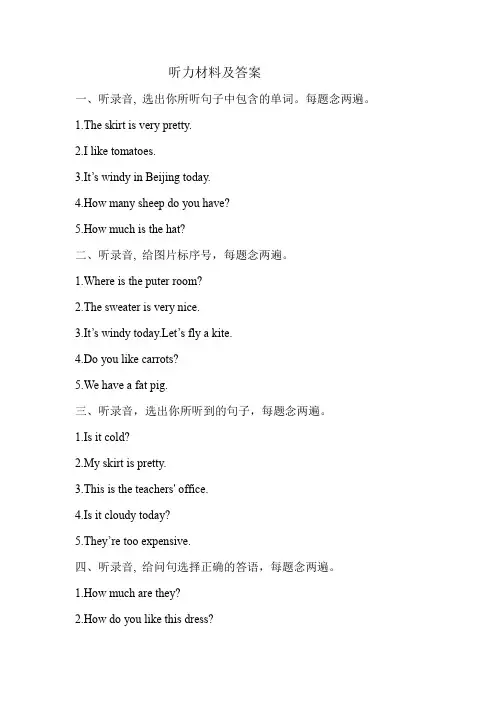
听力材料及答案一、听录音, 选出你所听句子中包含的单词。
每题念两遍。
1.The skirt is very pretty.2.I like tomatoes.3.It’s windy in Beijing today.4.How many sheep do you have?5.How much is the hat?二、听录音, 给图片标序号,每题念两遍。
1.Where is the puter room?2.The sweater is very nice.3.It’s windy today.Let’s fly a kite.4.Do you like carrots?5.We have a fat pig.三、听录音,选出你所听到的句子,每题念两遍。
1.Is it cold?2.My skirt is pretty.3.This is the teachers' office.4.Is it cloudy today?5.They’re too expensive.四、听录音, 给问句选择正确的答语,每题念两遍。
1.How much are they?2.How do you like this dress?3.Whose shoes are these?4.Can I go outside now?5.Where is the art room?答案:一.BABAC二.25314三.ABBAB四.BAABB五.BBBBA CBAAA六.ABBAB七.FFTFF BABCA八.Home,dinner,hot,gloves, socks 九.Help,size,How,are,too十.1.Is this the music room?2.They are horses.3.Whose shoes are these?4.How many students are there?5.What’s the weather like in Nanchong?。
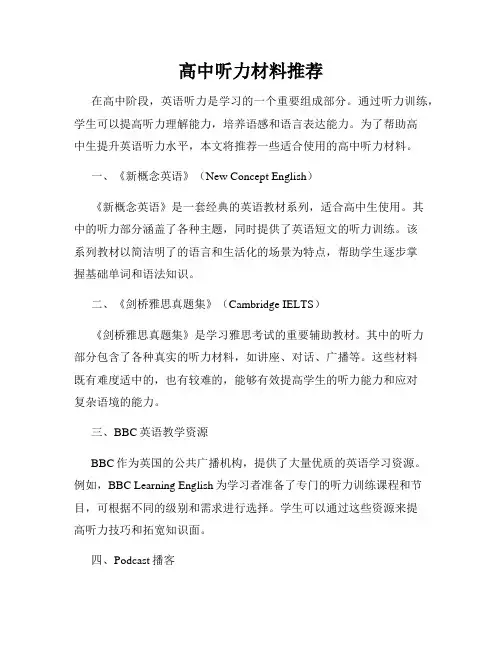
高中听力材料推荐在高中阶段,英语听力是学习的一个重要组成部分。
通过听力训练,学生可以提高听力理解能力,培养语感和语言表达能力。
为了帮助高中生提升英语听力水平,本文将推荐一些适合使用的高中听力材料。
一、《新概念英语》(New Concept English)《新概念英语》是一套经典的英语教材系列,适合高中生使用。
其中的听力部分涵盖了各种主题,同时提供了英语短文的听力训练。
该系列教材以简洁明了的语言和生活化的场景为特点,帮助学生逐步掌握基础单词和语法知识。
二、《剑桥雅思真题集》(Cambridge IELTS)《剑桥雅思真题集》是学习雅思考试的重要辅助教材。
其中的听力部分包含了各种真实的听力材料,如讲座、对话、广播等。
这些材料既有难度适中的,也有较难的,能够有效提高学生的听力能力和应对复杂语境的能力。
三、BBC英语教学资源BBC作为英国的公共广播机构,提供了大量优质的英语学习资源。
例如,BBC Learning English为学习者准备了专门的听力训练课程和节目,可根据不同的级别和需求进行选择。
学生可以通过这些资源来提高听力技巧和拓宽知识面。
四、Podcast播客Podcast是一种非常流行的听力材料形式,适合高中生使用。
通过订阅各类主题的英语播客,学生可以随时随地进行听力训练。
一些知名的英语播客如TED Talks、VOA Learning English等,提供了丰富的英语听力素材。
五、多媒体教材现代化的教育教学手段已经普及到许多学校中,多媒体教材也成为高中英语教学常用工具。
学生可以通过观看教学视频、听取音频材料来增加对英语听力的训练。
同时,多媒体教材结合图像、文字和声音,能够更好地激发学生的兴趣,提高学习效果。
六、英语影视剧和纪录片英语影视剧和纪录片是非常有趣且实用的听力材料。
学生可以选择自己感兴趣的题材,例如科学、历史、文化等,通过观看原版影视剧和纪录片来锻炼听力。
同时,学生还可以通过观看字幕和配乐来进一步理解剧情和提高语感。
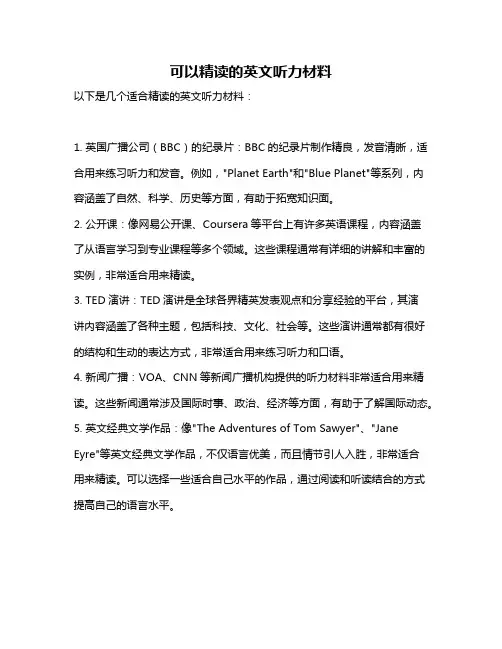
可以精读的英文听力材料
以下是几个适合精读的英文听力材料:
1. 英国广播公司(BBC)的纪录片:BBC的纪录片制作精良,发音清晰,适合用来练习听力和发音。
例如,"Planet Earth"和"Blue Planet"等系列,内容涵盖了自然、科学、历史等方面,有助于拓宽知识面。
2. 公开课:像网易公开课、Coursera等平台上有许多英语课程,内容涵盖
了从语言学习到专业课程等多个领域。
这些课程通常有详细的讲解和丰富的实例,非常适合用来精读。
3. TED演讲:TED演讲是全球各界精英发表观点和分享经验的平台,其演
讲内容涵盖了各种主题,包括科技、文化、社会等。
这些演讲通常都有很好的结构和生动的表达方式,非常适合用来练习听力和口语。
4. 新闻广播:VOA、CNN等新闻广播机构提供的听力材料非常适合用来精读。
这些新闻通常涉及国际时事、政治、经济等方面,有助于了解国际动态。
5. 英文经典文学作品:像"The Adventures of Tom Sawyer"、"Jane Eyre"等英文经典文学作品,不仅语言优美,而且情节引人入胜,非常适合
用来精读。
可以选择一些适合自己水平的作品,通过阅读和听读结合的方式提高自己的语言水平。
以上这些听力材料都是非常优秀的英语学习资源,可以通过反复听、跟读、理解等方式进行精读练习,提高自己的英语水平。
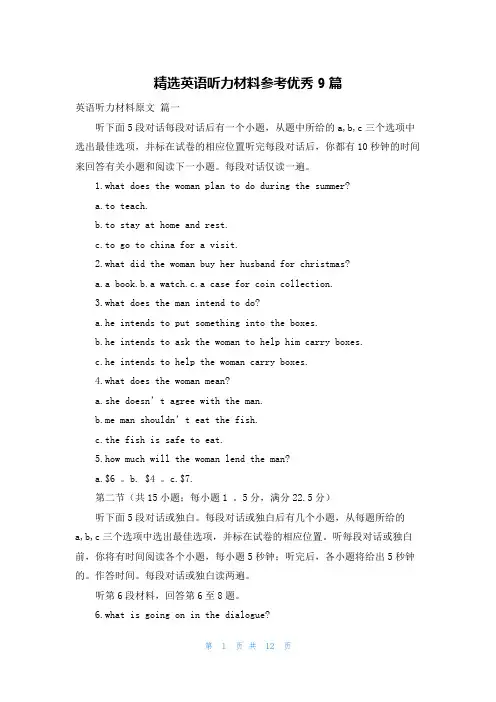
精选英语听力材料参考优秀9篇英语听力材料原文篇一听下面5段对话每段对话后有一个小题,从题中所给的a,b,c三个选项中选出最佳选项,并标在试卷的相应位置听完每段对话后,你都有10秒钟的时间来回答有关小题和阅读下一小题。
每段对话仅读一遍。
1.what does the woman plan to do during the summer?a.to teach.b.to stay at home and rest.c.to go to china for a visit.2.what did the woman buy her husband for christmas?a.a book.b.a watch.c.a case for coin collection.3.what does the man intend to do?a.he intends to put something into the boxes.b.he intends to ask the woman to help him carry boxes.c.he intends to help the woman carry boxes.4.what does the woman mean?a.she doesn’t agree with the man.b.me man shouldn’t eat the fish.c.the fish is safe to eat.5.how much will the woman lend the man?a.$6 。
b. $4 。
c.$7.第二节(共15小题;每小题1 。
5分,满分22.5分)听下面5段对话或独白。
每段对话或独白后有几个小题,从每题所给的a,b,c三个选项中选出最佳选项,并标在试卷的相应位置。
听每段对话或独白前,你将有时间阅读各个小题,每小题5秒钟;听完后,各小题将给出5秒钟的。
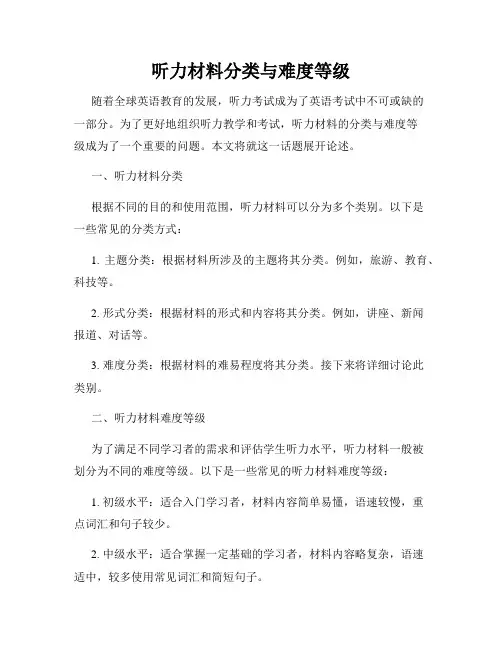
听力材料分类与难度等级随着全球英语教育的发展,听力考试成为了英语考试中不可或缺的一部分。
为了更好地组织听力教学和考试,听力材料的分类与难度等级成为了一个重要的问题。
本文将就这一话题展开论述。
一、听力材料分类根据不同的目的和使用范围,听力材料可以分为多个类别。
以下是一些常见的分类方式:1. 主题分类:根据材料所涉及的主题将其分类。
例如,旅游、教育、科技等。
2. 形式分类:根据材料的形式和内容将其分类。
例如,讲座、新闻报道、对话等。
3. 难度分类:根据材料的难易程度将其分类。
接下来将详细讨论此类别。
二、听力材料难度等级为了满足不同学习者的需求和评估学生听力水平,听力材料一般被划分为不同的难度等级。
以下是一些常见的听力材料难度等级:1. 初级水平:适合入门学习者,材料内容简单易懂,语速较慢,重点词汇和句子较少。
2. 中级水平:适合掌握一定基础的学习者,材料内容略复杂,语速适中,较多使用常见词汇和简短句子。
3. 高级水平:适合有一定英语听力能力的学习者,材料内容较复杂,语速较快,使用较多的高级词汇和长句。
不同等级的听力材料可以帮助学习者逐步提高听力技巧和语言运用能力。
在教学和考试中,学生可以按照自己的实际水平选择适当难度的材料进行学习和练习。
三、听力材料分类与难度等级的重要性听力材料的分类与难度等级对于教学和考试都具有重要意义。
首先,合理分类听力材料可以帮助教师更好地组织教学内容,根据学生的水平选择适当的材料进行教学。
这样可以提高教学效果,让学生在适当的挑战中不断进步。
其次,根据难度等级划分听力材料可以为学生提供明确的学习目标和评估标准。
学生可以根据自己的实际情况选择适合自己的等级进行学习,同时可以通过逐级挑战提高听力水平。
最后,将听力材料按照难度等级分类也方便了考试的组织和评估。
考试机构可以根据学生报名情况和需求,提供不同难度等级的听力材料供学生选择。
综上所述,听力材料的分类与难度等级在英语教学和考试中扮演着重要的角色。
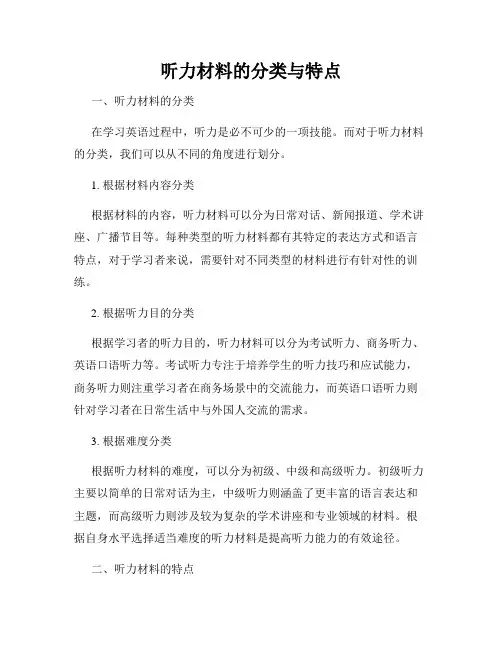
听力材料的分类与特点一、听力材料的分类在学习英语过程中,听力是必不可少的一项技能。
而对于听力材料的分类,我们可以从不同的角度进行划分。
1. 根据材料内容分类根据材料的内容,听力材料可以分为日常对话、新闻报道、学术讲座、广播节目等。
每种类型的听力材料都有其特定的表达方式和语言特点,对于学习者来说,需要针对不同类型的材料进行有针对性的训练。
2. 根据听力目的分类根据学习者的听力目的,听力材料可以分为考试听力、商务听力、英语口语听力等。
考试听力专注于培养学生的听力技巧和应试能力,商务听力则注重学习者在商务场景中的交流能力,而英语口语听力则针对学习者在日常生活中与外国人交流的需求。
3. 根据难度分类根据听力材料的难度,可以分为初级、中级和高级听力。
初级听力主要以简单的日常对话为主,中级听力则涵盖了更丰富的语言表达和主题,而高级听力则涉及较为复杂的学术讲座和专业领域的材料。
根据自身水平选择适当难度的听力材料是提高听力能力的有效途径。
二、听力材料的特点1. 涉及多样的语言表达方式听力材料中,学习者将接触到丰富多样的语言表达方式,例如自然对话、口音变化、语速快慢等。
这些不同的语言表达方式对于学习者来说,都需要进行适应和理解,从而提高对不同语言形式的识别和理解能力。
2. 语言信息瞬间流逝相比阅读和写作,听力材料的语言信息是瞬间流逝的。
学习者需要在有限的时间内对信息进行听取、理解和记忆,这对于英语学习者来说是一项挑战。
因此,提高听力技巧和速度的训练是必不可少的。
3. 信息的不完整与省略听力材料中,信息往往是不完整和省略的,这是为了模拟真实的语言环境。
学习者需要通过上下文的理解和推测来填补信息的空缺,从而准确地理解听力材料的意思。
4. 语音语调的变化听力材料中,语音语调的变化是很常见的。
例如,不同的发音、弱读、连读等,这些都给学习者带来困扰。
学习者需要通过大量的听力训练来熟悉并理解这些语音语调的变化。
5. 听力材料的真实性与阅读材料相比,听力材料更加贴近真实语言环境。
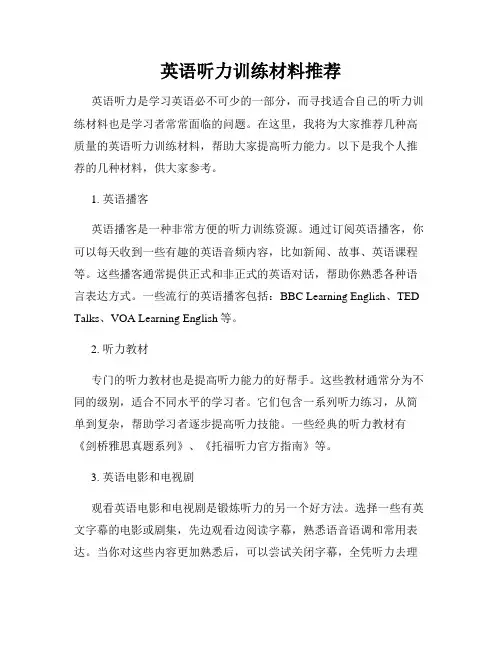
英语听力训练材料推荐英语听力是学习英语必不可少的一部分,而寻找适合自己的听力训练材料也是学习者常常面临的问题。
在这里,我将为大家推荐几种高质量的英语听力训练材料,帮助大家提高听力能力。
以下是我个人推荐的几种材料,供大家参考。
1. 英语播客英语播客是一种非常方便的听力训练资源。
通过订阅英语播客,你可以每天收到一些有趣的英语音频内容,比如新闻、故事、英语课程等。
这些播客通常提供正式和非正式的英语对话,帮助你熟悉各种语言表达方式。
一些流行的英语播客包括:BBC Learning English、TED Talks、VOA Learning English等。
2. 听力教材专门的听力教材也是提高听力能力的好帮手。
这些教材通常分为不同的级别,适合不同水平的学习者。
它们包含一系列听力练习,从简单到复杂,帮助学习者逐步提高听力技能。
一些经典的听力教材有《剑桥雅思真题系列》、《托福听力官方指南》等。
3. 英语电影和电视剧观看英语电影和电视剧是锻炼听力的另一个好方法。
选择一些有英文字幕的电影或剧集,先边观看边阅读字幕,熟悉语音语调和常用表达。
当你对这些内容更加熟悉后,可以尝试关闭字幕,全凭听力去理解对话内容。
英语电影和电视剧不仅能提高听力能力,还能加深对英美文化的了解。
4. 英语新闻和广播英语新闻和广播是提高听力技能的常用资源。
你可以选择一些英文新闻网站或收听英语广播,比如BBC、CNN等。
每天花一些时间听英语新闻,不仅能增加词汇量,也能熟悉不同的语速和发音方式。
对于初学者来说,可以先选择一些速度较慢、清晰度较高的新闻节目,随着听力提高,再尝试听一些语速较快的新闻。
总结以上是我为大家推荐的几种英语听力训练材料,包括英语播客、听力教材、英语电影和电视剧、英语新闻和广播。
每个人的英语水平和学习需求不同,选择合适的材料是关键。
希望以上推荐能帮助大家找到适合自己的英语听力训练材料,并在听力方面取得进步。
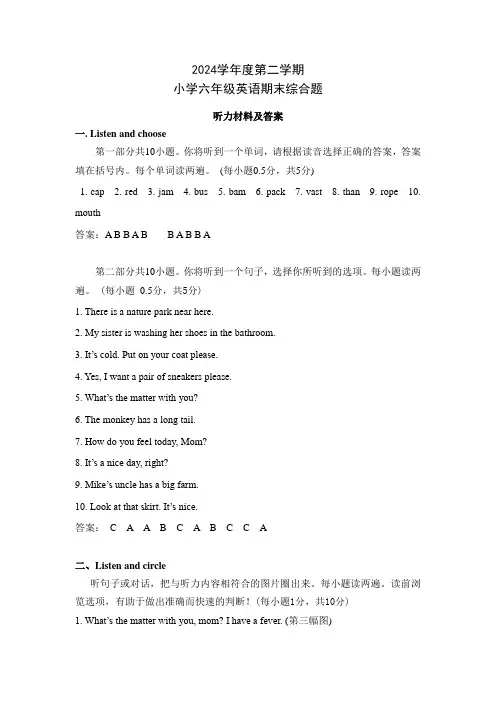
2024学年度第二学期小学六年级英语期末综合题听力材料及答案一. Listen and choose第一部分共10小题。
你将听到一个单词,请根据读音选择正确的答案,答案填在括号内。
每个单词读两遍。
(每小题0.5分,共5分)1. cap2. red3. jam4. bus5. bam6. pack7. vast8. than9. rope 10. mouth答案:A B B A B B A B B A第二部分共10小题。
你将听到一个句子,选择你所听到的选项。
每小题读两遍。
(每小题0.5分,共5分)1. There is a nature park near here.2. My sister is washing her shoes in the bathroom.3. It’s cold. Put on your coat please.4. Yes, I want a pair of sneakers please.5. What’s the matter with y ou?6. The monkey has a long tail.7. How do you feel today, Mom?8. It’s a nice day, right?9. Mike’s uncle has a big farm.10. Look at that skirt. It’s nice.答案: C A A B C A B C C A二、Listen and circle听句子或对话,把与听力内容相符合的图片圈出来。
每小题读两遍。
读前浏览选项,有助于做出准确而快速的判断!(每小题1分,共10分)1. What’s the matter with you, mom? I have a fever. (第三幅图)2. What does your aunt do? She’s a salesperson. (第三幅图)3. Is the car under the box? No, it’s behind it. (第一幅图)4. What would you like for lunch? I’d like some chicken, cucumbe rs, carrots and grapes. (第二幅图)5. What can you do Mike? I am helpful. I can cook the meals. (第一幅图)6. Go at a green light. (第三幅图)7. How do you go to Canada? By ship. (第二幅图)8. What are they doing? They are watching insects. (第一幅图)9. Are those your socks? Yes, they are. (第一幅图)10. How to plant a tree? First, dig the soil. (第二幅图)三、Listen and answer(根据你在录音中的问题,将下面每组答句中最合适的答案选出来,并将其前面的字母符号填在句子前面的括号里(每小题1分,共10分)( B ) 1. When did you go to the park, Alice?( C ) 2. Can Mike play the violin?( C) 3. What is your math teacher like?( C ) 4. Is there a forest in the village?( B ) 5. Where does the vapour come from?( A ) 6. Hey, boy! Whose comic book is it?( B) 7.Why don’t you like summer, little Tom?( A ) 8. What does that woman do?( C ) 9. When is Teachers’ Day?( B ) 10. What did your parents do last night?四、Listen and fill听对话或独白,填入所缺的单词,使对话意思合理、完整,每空只填一词。
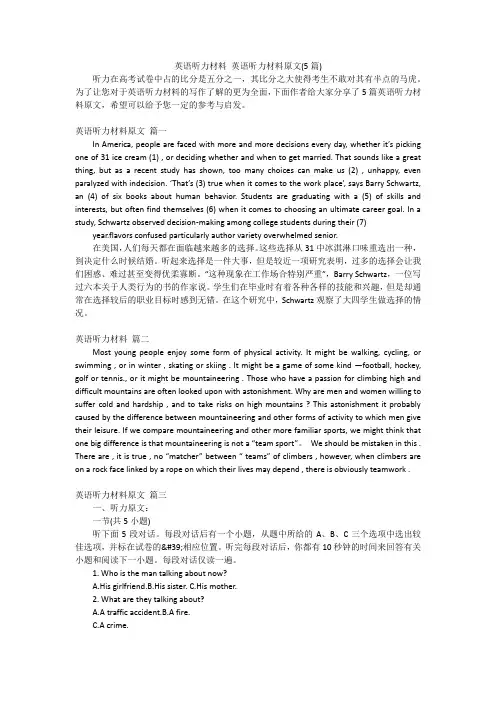
英语听力材料英语听力材料原文(5篇)听力在高考试卷中占的比分是五分之一,其比分之大使得考生不敢对其有半点的马虎。
为了让您对于英语听力材料的写作了解的更为全面,下面作者给大家分享了5篇英语听力材料原文,希望可以给予您一定的参考与启发。
英语听力材料原文篇一In America, people are faced with more and more decisions every day, whether it’s picking one of 31 ice cream (1) , or deciding whether and when to get married. That sounds like a great thing, but as a recent study has shown, too many choices can make us (2) , unhappy, even paralyzed with indecision. ‘That’s (3) true when it comes to the work place’, says Barry Schwartz, an (4) of six books about human behavior. Students are graduating with a (5) of skills and interests, but often find themselves (6) when it comes to choosing an ultimate career goal. In a study, Schwartz observed decision-making among college students during their (7) year.flavors confused particularly author variety overwhelmed senior.在美国,人们每天都在面临越来越多的选择。
专业的听力素材推荐在学习英语的过程中,提高听力水平是非常重要的一项任务。
而寻找合适的听力素材则是提高听力能力的关键。
本文将介绍一些专业的听力素材推荐,以帮助读者有效地提升听力技巧。
一、新闻和广播节目新闻和广播节目是提高听力技能的绝佳素材。
可以通过收听国际、国内新闻以及英语广播节目,了解最新的时事动态,并熟悉各种口音和语速。
例如,BBC News和CNN提供了世界各地的新闻报道,同时还有针对学生的英语广播节目,如VOA Learning English和BBC Learning English。
这些资源都可以通过官方网站或相关手机应用程序进行在线收听。
二、纪录片和讲座纪录片和讲座是提高听力技能的另一种好方式。
通过观看纪录片,可以听到英语的正式语言和专业知识。
而参加讲座则可以了解相关领域的最新研究成果和专业术语。
许多大学和学术机构都会在线发布他们的讲座录像,如TED Talks、MIT OpenCourseWare和Yale University 的开放课程等。
三、影视剧和电台节目观看英语影视剧和收听英语电台节目可以提高听力技能,并增加对日常对话和俚语的了解。
可以从喜剧剧集开始,因为它们通常使用幽默的语言和常用口语。
影视剧和电台节目可以在各大视频网站和音频平台上找到。
一些受欢迎的英语电台节目包括BBC Radio 1、NPR和CBC Radio。
四、听力教材和练习资料为了更系统地提高听力水平,可以使用一些专门设计的听力教材和练习资料。
这些资源通常包括不同难度级别的听力材料,如配套的录音和听力理解练习。
一些知名的听力教材包括剑桥大学出版社的《剑桥雅思真题》系列和剑桥大学出版社的《剑桥托福真题》系列。
五、在线学习平台在线学习平台也是获取专业听力素材的好去处。
像Coursera、edX 和Udemy这样的平台提供了各种学科的在线课程,其中包括与听力相关的主题。
这些课程通常包含有声教材和听力练习,可以帮助你提高听力技能并学习相关领域的专业知识。
听力理解练习题长文听力在当今全球化的背景下,跨文化交流和理解变得越来越重要。
作为一种语言技能,听力在跨文化交流中扮演着重要角色。
为了提高听力能力,下面将为大家提供一段长文听力材料,并附带相关练习题,以帮助大家进行听力训练。
[长文听力材料]Welcome to the International Music Festival! Today, we have a special guest, the renowned pianist Sarah Johnson. Sarah has been invited to perform a selection of classical masterpieces for us this evening. Her passion for music and her exceptional skills on the piano have earned her a worldwide reputation.Sarah began playing the piano at the age of five and quickly displayed extraordinary talent. She won numerous awards and scholarships throughout her childhood. At the age of eighteen, she was accepted into one of the top music schools in the country. Since then, Sarah has continuously expanded her repertoire and enchanted audiences around the world.Tonight's performance will include pieces from the Romantic era, such as Beethoven's "Moonlight Sonata" and Chopin's "Nocturne in E-flat major." Sarah will also showcase her versatility with modern compositions, including the works of contemporary composers like John Williams and Yiruma. The concert promises to be a captivating evening, filled with emotion and virtuosity.We are fortunate to have Sarah Johnson with us today, as she is in high demand worldwide. Her concert tickets are always sold out months in advance. As an expression of gratitude for her performance here tonight, a portion of the ticket sales will be donated to a local music foundation, supporting young musicians in need.Please turn off your mobile phones and refrain from taking photographs during the performance, as it may disrupt the concentration of the artist and affect the enjoyment of fellow audience members. Remember to maintain a respectful silence throughout the concert to fully immerse yourself in the beauty of the music.Thank you for joining us at the International Music Festival. We hope you have a wonderful evening of music ahead. Please welcome Sarah Johnson to the stage![练习题]1. Where is the International Music Festival taking place?2. Who is the special guest performing tonight?3. When did Sarah Johnson start playing the piano?4. What type of music will be performed tonight?5. What will a portion of the ticket sales be used for?请听一段长文听力材料并回答以下问题。
以下是一些适合用于语文听力训练的材料:
1.语文课本:语文课本是听力训练的首选材料,其中包含了大量的课文和生词,可以帮助
学习者熟悉标准的发音和语调。
2.新闻广播:新闻广播是提高听力技能的好途径,可以了解时事新闻,同时还可以熟悉标
准的播音员发音和语速。
3.电影、电视剧:这些媒体资源可以提供真实的语言环境,帮助学习者更好地理解语言,
同时还可以学习到日常生活中的表达方式。
4.演讲、讲座:这些材料通常比较正式,可以提供一些学术性的知识和语言表达方式。
5.文学作品:通过阅读文学作品,可以了解更多的语言表达方式和修辞手法,提高语文水
平。
6.网络资源:现在有很多在线的听力训练资源,如听力录音、视频、在线课程等,可以根
据个人需求选择适合自己的材料。
在进行语文听力训练时,建议采取多种材料结合的方式,从多个角度提高听力技能。
同时,也要注意材料的难度和自己的水平匹配,不要选择过于困难的材料,以免影响自信心和学习兴趣。
听力训练材料注意力是大脑功能中至关重要的一环,它对于我们的日常生活、学习和工作都有着重要的影响。
然而,由于现代社会的快节奏和信息爆炸,我们经常面临着各种干扰和注意力不集中的问题。
为了增强我们的注意力和专注力,进行听力训练是一种非常有效的方法。
本文将介绍一些常见的听力训练材料,帮助我们提高注意力和听力能力。
一、自然音效材料自然音效材料是一种非常常见的听力训练材料,通过模拟自然界的各种声音,帮助我们专注并提高听力能力。
比如,我们可以选择一些海浪声、鸟鸣声、雨声等自然音效来进行听力训练。
在一个安静的环境中,闭上双眼,专注地倾听这些声音,同时观察自己内心的变化。
这样的训练可以帮助我们放松身心,集中注意力,提高我们的听觉敏感度和专注力。
二、音乐欣赏材料音乐是一种非常有效的调节心理状态和提高注意力的方式。
选择适合自己的背景音乐,例如轻快的古典乐、舒缓的轻音乐等,利用这些音乐进行听力训练可以帮助我们进入一种良好的心理状态,提高我们的专注力和听觉感知能力。
可以选择一首喜欢的音乐,闭上眼睛,专注地倾听这首音乐,尽量感受音乐的每一个细节,训练我们的专注力和耳朵的敏感度。
三、语言材料训练语言材料训练是提高听力能力的常见方法之一。
可以选择一些有声书、英语教学材料或者其他语言学习材料进行听力练习。
在听的过程中,要尽量理解和抓住重点,同时可以通过笔记的方式记录下听到的内容,以检验自己的听力理解能力。
这样的训练有助于我们提高听力准确度和理解能力,培养我们的耐心和专注力。
四、大脑训练材料大脑训练材料是一种相对较高级的听力训练方式,可以帮助我们提高对复杂信息的处理和理解能力。
例如,可以选择一些听力测试题、逻辑题、谜题等进行训练。
这些训练材料往往需要我们同时运用注意力、记忆力和推理能力等多个方面的能力,通过不断地练习,可以增强我们的大脑功能,提高我们的听力能力和思维能力。
五、静心冥想材料静心冥想是一种通过放松身心、疏导杂念来提高专注力和注意力的方法。
高中听力训练材料第一部分:短对话对话1:Man: I can't believe we have to write an essay on this book. It's so boring!Woman: I know, right? I really don't understand why the teacher chose it.对话2:Man: Have you heard about the upcoming school trip?Woman: Yes, I have. I heard that we're going to a national park. It should be fun!对话3:Man: Did you finish the chemistry lab report?Woman: No, I haven't. I couldn't figure out the last question. It's really challenging.对话4:Man: I heard that the school play got canceled. Is that true?Woman: Yes, unfortunately. The lead actor got sick and they couldn't find a replacement in time.对话5:Man: I have no idea how to solve this math problem. Can you help me?Woman: Sure, let me take a look. It's a bit tricky, but I think I can explain it to you.第二部分:长对话对话1:Man: Have you started studying for the college entrance exams?Woman: Yes, I have. I've been studying every day after school.Man: That's impressive. How do you manage your time?Woman: I have a study schedule that helps me stay organized. I prioritize my subjects based on their difficulty.对话2:Man: Are you going to join the school music club this year?Woman: I'm thinking about it. I've always enjoyed singing, but I'm not sure if I can commit to the regular rehearsals.Man: Well, it could be a great opportunity to improve your skills and meet new people.Woman: You're right. I'll give it a try and see how it goes.对话3:Man: Did you sign up for the physics Olympiad?Woman: No, I didn't. I don't feel confident enough in my physics skills to compete.Man: You shouldn't underestimate yourself. With some practice and dedication, you could excel in the competition.Woman: Maybe you're right. I'll reconsider and see if I can still register.对话4:Man: Have you decided on your college major?Woman: Not yet. I'm torn between psychology and computer science.Man: Both fields have their advantages. Have you talked to professionals in each field to get a better understanding?Woman: Yes, I've been conducting informational interviews to gather more information.对话5:Man: I'm really struggling with time management. I always leave things to the last minute.Woman: It's a common problem. Have you tried setting specific goals and deadlines for yourself?Man: I haven't, but I think that could be helpful. I need to learn how to prioritize my tasks effectively.Woman: Start small and gradually build up your time management skills. It takes practice, but it's definitely achievable.第三部分:短文听力材料1:Hello, students. I'm excited to announce that our school will be hosting a talent show next month. We encourage all students to participate and showcase their talents. Singing, dancing, magic tricks, and even stand-up comedy are all welcome. Sign-up sheets will be posted in the main office. Don't miss out on this opportunity to shine!听力材料2:Attention, all juniors and seniors. There will be a college fair held in the gymnasium this Saturday. Representatives from various universities will be present to discuss their programs and answer any questions you may have.It's a great chance to gather information and explore your options. Make sure to bring a notepad and some questions to ask the representatives.听力材料3:Good morning, students. This is a reminder for all members of the debate club. Our weekly meeting will be held tomorrow after school in the library. We'll be discussing the upcoming debate tournament and assigning topics to each participant. It's important that all members attend. Let's work together to sharpen our argumentative skills and bring home the trophy!听力材料4:Attention, athletes. The annual school sports day will be held next month. We're looking for students to represent our school in various sports events, including track and field, basketball, and soccer. If you're interested in participating, please sign up in the PE office by the end of this week. Let's show our school spirit and compete with integrity!听力材料5:Hello, students. As we approach the end of the semester, it's crucial to stay focused and dedicated to your studies. Remember to review your notes, complete assignments on time, and seek help when needed. The school library offers tutoring services in various subjects. Take advantage of these resources and make the most out of your education. Good luck with your exams!。
高中听力训练的材料选择高中阶段,学生们需要提高听力能力,以便更好地理解英语听力材料。
为了有效地进行听力训练,选择合适的材料非常重要。
在这篇文章中,将讨论几种适合高中听力训练的材料选择。
1. 真实场景录音:真实场景录音是指从真实生活中录制下来的声音。
这种材料可以提供给学生们更接近现实生活的听力挑战。
比如,电话对话、商店购物、旅行等场景的录音可以帮助学生们更好地适应真实场景中的英语对话。
2. 新闻广播:新闻广播是一个非常有用的听力训练材料选择,因为它可以帮助学生们提高对复杂语境和不同口音的理解能力。
学生们可以选择来自不同新闻机构的广播,以便接触到不同主题和语言风格的报道。
3. 学术讲座:高中阶段,学生们将面临各种学科的学术讲座,因此选择学术讲座作为听力材料是非常恰当的。
这样的材料可以帮助学生们培养对学术英语的理解能力,提高听力技巧和词汇量。
4. 电影和电视节目:观看英语电影和电视节目是提高听力技能的有趣方式。
学生们可以选择字幕与音频一起观看,以便更好地理解对话。
此外,学生们可以选择不同类型的电影和电视节目,以丰富他们的词汇和语言技巧。
5. 音频教材:为高中听力训练特别设计的音频教材可以很好地满足学生们的需求。
这些教材通常包含与高中课程内容相关的对话和材料,帮助学生们提高对课堂内容的理解和应用能力。
6. 英语广播和播客:英语广播和播客是学习英语听力的理想选择。
学生们可以选择自己感兴趣的主题,听取不同主持人的讨论和采访。
这种材料可以帮助学生们更好地掌握英语中的表达方式、流利度和交流技巧。
7. 视频剪辑和演讲:通过观看英语演讲和视频剪辑,学生们可以提高对不同语速、语调和语言风格的理解能力。
演讲和视频剪辑可以来自各个领域,包括科学、历史、文学等,帮助学生们培养跨学科的知识和词汇量。
总之,在高中阶段的听力训练中,选择合适的材料是至关重要的。
真实场景录音、新闻广播、学术讲座、电影和电视节目、音频教材、英语广播和播客以及视频剪辑和演讲都是很好的选择。
Task 4Drill #1 Heart Valve ReplacementPeople with defective(有缺陷的)heart valves need them replaced, and what’s often used is the heart valve from a pig. It’s called a “porcine valve” because of that: A pig’s valve is very similar to a person’s, and because pig valves are natural and tend to be accepted by the body, patients who receive them require little treatment after surgery…relatively, for transplant(器官移植)patients, I mean. Now, there are problems. For example, pig valves tend to last around ten years---not very long.Actually, now that I’m on that topic, I might mention that porcine valves are not the only option. Alternative valves have been developed that are entirely artificial.They’re made of plastic and metal. These valves can last for decades---certainly a lot longer than pig valves. But the human body recognizes that plastic and metal are artificial. So what happens is that blood sticks to them, and blood clots(血凝块)form around them. These clots are dangerous because they can block the flow of blood. For that reason, patients who receive artificial valves spend the rest of their lives taking drugs that prevent blood from clotting. The drugs can be tough for the body tohandle, but they’re worth it for the sake of having a functioning heart valve.Drill #2 Birds of Prey(捕食,掠食)There are two bird species found in our local area that I think do a good job of exemplifying the range of ways birds of prey can adapt. One is the bald eagle, and the other is the great blue heron(鹭). They both feed largely on fish, and they’re both large. But the more closely you observe them, the more the differences show.The bald eagle is always on the lookout(警戒)for dead fish at the side of river or lake or for fish that it can grab from close to the surface of the water. That’s because it has very sharp eyesight and strong talons. It can swoop(俯冲)down, grab a fish in its claws, and start eating it midair,food into its mouth.The great blue heron might eat those same fish, but it would have to go about it differently. The heron does have good eyesight----it’d be hard to see prey otherwise, right? Butits claws aren’t as strong as the eagle’s, so it usually attacks by diving into the water head-first. The heron has a long, straight beak that it can use either like a spear(矛,枪,鱼叉)to impale(钉在……上)a fish or like tongs(V形夹子)to grab it.Drill #3 BehaviorismOne of the earliest behaviorists is Ivan Pavlov, an experimental psychologist noted for his studies of the reflex reaction in humans and animals. A reflex is an involuntary(无意识做出的)action of the body, such as a sneeze, a blink, or a hiccup(打嗝). Pavlov did a series of experiments using dogs. He found that when a bell is rung each time a dog is fed, the dog starts to associate the sound of the bell with food. Consequently, whenever the bell rings, the dog expects food. The dog salivates(分泌唾液)and drools(流口水),and there is an increase in the flow of this stomach juices. The dog’s bodily response to the bell is a conditioned reflex, a behavior that occurs because the dog has been trained by the sound of the bell.Pavlov’s experiments with dogs and discovery of the conditioned reflex contributed to the development of behaviorism. The dog’s bodily response---- its behavior ---- does not come from something inside he dog. Rather, the behavior is the result of conditioning, the careful control of the dog’s environment. Pavlov argued that the dog’s behavior ---- drooling ---- was strictly a reaction to the environmental stimulus of the bell.Drill #4 Work and Family RolesNot surprisingly, women report more conflict between work and family roles. Women who work outside the home actually put in more hours of work at home. Women do more of the childcare and housework than their husbands do, whether the woman works full-time or not. Women are much more likely to leave the workforce entirely when their children are young. They’re also more likely to stay home with a sick child or to be the one to rearrange their work schedule to go to a meeting at the child’s school. They’re more likely to feel overworked and stressed-out.For most men, including men who are highly successful in their careers, family is far more important than work for their overall life satisfaction. The roles of husband and father are central to a man’s mental and physical health. So it’s not surprising that men carry emotional distress from the family into the workplace, even though they don’t experience the same degree of role conflict or overload as women do. In one study of working men and women, men more often than women reported that an argument at home was followed by higher rates of argument with coworkers or supervisors at work the next day.The same study reported that when the man came home overly tired from work, the wives did more of the work at home. The reverse pattern occurred less often: the husband did not do more of the work at home after his wife had had an especially hard day at work.Task 6Drill #1All foods will eventually spoil(v.变质)if they’re not preserved. Food preservation is the process of preventing or slowing the natural decay(v. & n.腐烂)of edible plants and animals, spoilage(n.腐败,损坏)that results from microorganisms(微生物)– bacteria, molds(霉菌), and yeasts (酵母,发酵物)– that are present in the food.The most natural method of preserving food is drying. Nature preserves the seeds for next year’s crop by drying the outer layers of fruits and vegetables that are exposed to the sun and air. We copy nature’s effects by exposing food to warm air, a method that removes all the water that would otherwise lead to spoilage. Microorganisms need moisture(水分,水汽)to grow, so removing the water will stop the microorganisms from growing.Drying is a very ancient form of food preservation. Prehistoric (史前的)people dried grains, fruits, and nuts in the sun. When fire was discovered, they learned to smoke meat and fish by the fireside. Native Americans dried and chopped (剁,砍)meat, then mixed it with fat. The lack of moisture in the meat kept it from spoiling. Modern industrial science hasperfected the techniques of drying and applied them to the mass production of a variety of foods, such as powdered eggs and milk, peas, mushrooms, coffee, soups, and salad dressings.Another method of food preservation is curing(食物加工法). Curing is done by adding ingredients(佐料,配料), such as salt, sugar, spices, or lemon juice. Curing is one of the oldest methods of food preservation and is still used in the production of many meats and fish. The ingredients used in curing have unique reactions with the food they’re added to. For example, salt slows the growth of microorganisms and removes some of the water from the food. Sugar counteracts (对抗,抵消)the hardening(潮解)that’s sometimes caused by salt. Lemon or lime(酸橙汁)juice added to raw(生的,未加工的)fish will preserve the fish for a short time without removing all the moisture.Drill #2Although cities have not generally been associated with wildlife, there are many species that have become so much apart of the urban landscape that they are, for the most part, unnoticed neighbors. For example, in New York’s Central Park, almost 300 species of birds have been identified. Urban parks certainly provide some of the world’s safest and in many ways, best wildlife habitats, and as the natural habitats shrink, well, these urban parks will become more and more important to the conservation of wildlife, including not only birds…but, uh…but also freshwater animals and, even small mammals. So, as you see, man-made areas are one important type of habitat in cities.in the urban landscape…these can also provide a home for animals that adapt to life in the city. For instance, chimney swifts(北美洲产的燕子)are birds that originally lived in hollow trees, but now chimney swifts are commonly found in the long brick chimneys in factories or other vertical shafts(耸立的直筒)in tall buildings. Think about it. A city has more chimneys than there are hollow trees in a forest of equal area. Consequently, these birds flock(成群结队地飞向)to the city. Another case of adaptation is the urban drainage(排水,排水系统)system, which is usually made up of concrete ditches(沟,渠), and they naturally attract stream and marsh(沼泽)animals. Again, to use New York City as anexample, probably 250 species of fish are found in the harbor (海港), many of which make their way into the pools and ponds and ditches in the New York drainage system. In Boston, the Back Bay was actually designed to create habitats and attract marshland wildlife to the city.Drill #3Okay, as you’ll recall, caves form in limestone(石灰岩)when acidic(酸性的)groundwater follows some kind of weakness in the rocks. Now the rock formations(岩层)in a cavern…that’s the technical name that we use for a cave…the rock formations there are of two kinds…stalactites(钟乳石)and stalagmites(石笋). Both of these formations are water that contains dissolved(可溶解的)minerals that… that accumulate and build deposits(沉淀物). But stalactites hang down from the ceiling of the cavern, and stalagmites protrude(使伸出,突出)up from the floor of the cavern.Well, these words sound a lot alike, and this can be confusing, so I always tell my students to remember that there is a t in stalactites, and the t has a tail that hangs down just likethe stalactites that hang down from the ceiling of the cave, but there is an m in stalagmites and the points on an m stick up(竖起)like the stalagmites that protrude up from the ground in a cave. And if that doesn’t work for you, another way to remember the difference is that stalactite has a c in it, and so does the word ceiling, whereas stalagmite has a g in it, and so does the word ground. So stalactites drip down(滴下)from the ceiling and stalagmites build up from the ground. So with these little tricks for remembering the difference, I expect you all to get this right on the next quiz.Drill #4A major study shows that the world’s oceans face several serious problems related to overfishing, pollution, climate change, and loss of habitat.At least one-third of the fish stocks(家世,家系,血统)are “overfished”. This includes several groundfish species that will take decades to recover. The estimated number of large ocean predators(捕食性鱼类)----tuna, marlin, sharks, and halibut(大比目鱼)----has fallen 90 percent globally in half acentury. One reason for overfishing is bottom trawling(拖网捕鱼)the practice(n.常规,惯例)of dragging nets along the sea bottom to catch huge quantities of fish. Bottom fishing with nets can destroy habitat and contribute to fish declines.Pollution is a serious and growing danger. Land-based pollution in the form of erosion puts silt(淤泥)into the ocean, killing marine life close to shores. Cargo ships, container ships, and cruise(乘船游览)ships dump(倾倒)at least 65 million gallons of petroleum products a year into the seas. Even small amounts of oil can damage sensitive marine environments. Scientists estimate that nearly 30 million gallons of petroleum seep(液体渗透)into North American waters every year, most of it from runoff, seaplanes, and small boats.Climate change is causing new disease outbreaks(爆发,突然发生)in ocean environments, affecting everything from coral reefs to oysters(牡蛎). Diseases threaten many corals in the Pacific. Since coral reefs provide rich habitat for fish, the loss of coral contributes to fish declines. Climate change also hurts large mammals that depend on fish. In the Arctic, melting ice may be preventing polar bears from reaching their fishing areas, and this affects their breeding patterns and thesurvival of their young cubs(幼小的兽).1. green grain2. warm worm3. wonder wander4. fear fair fire (on fire unfair)5. east yeast/i:st/ /ji:st/6. horse house1. grad=graduation2. math(s)=3. P.E.=phys.ed.=4. intro=5. dorm=6. gym=gymnasium Thesis dissertationL.A. /el/ /ei/L m n o p w /el/ /em/ /en/ //Task 61. listen to a lecture: 1 professor,1.5~2 mins2. 准备:20 s3. 答题: 60 s特点:1. 词汇 2. 信息量 3. 句式/语法策略:1. 背单词 2. 笔记量 3. 二次重复 4. 重读、停顿 5. 结构词:核心:1+2答题:1. 时间 2. 句式:。